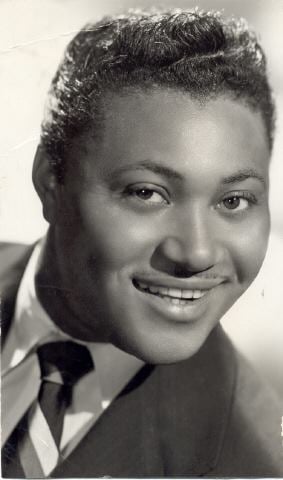January 3, 1980 Amos Milburn died in Houston
Milburn was an important performer of blues music in the years immediately after World War II. He was one of the first performers to switch from sophisticated jazz arrangements to the louder jump blues style. He began to emphasize rhythm and technical qualities of voice and instrumentation second. He was a commercial success for eleven years and influenced many performers. His energetic songs about getting “high” were admired by fellow musicians, such as Little Willie Littlefield, Floyd Dixon and Milburn’s prime disciple, Fats Domino. Domino consistently credited Milburn as an influence on his music. Most famous for his drinking songs including, “Let Me Go Home, Whiskey” and ‘”One Scotch, One Bourbon, One Beer.” One commentator noted, “Milburn excelled at good-natured, upbeat romps about booze and partying, imbued with a vibrant sense of humor and double entendre, as well as vivid, down-home imagery in his lyrics.”
One of thirteen children, by the age of five, Milburn was already playing tunes on the piano. He enlisted in the United States Navy when he was fifteen and earned thirteen battle stars in the Philippines. He returned to Houston and organized a sixteen-piece band playing in clubs in the city. He was managed by William and Geneva Church.
A polished pianist and performer by 1946, he attracted the attention of a woman who became his manager and arranged a recording session with Aladdin Records in Los Angeles. Lola Anne Cullum reportedly barged into Aladdin boss Eddie Mesner’s hospital room, toting a portable disc machine with Milburn’s demo all cued up. The gambit worked and Milburn signed with Aladdin in 1946. His first date included a thundering “Down the Road Apiece” that presaged the imminent rise of rock & roll. But Milburn was capable of subtler charms too, crooning mellow blues ballads in a Charles Brown-influenced style (the two would later become close friends, playing together frequently).

Milburn’s relationship with Aladdin lasted eight years, during which he recorded more than 75 sides. His cover version of “Down the Road a Piece” (1946), a blues song with a Texas boogie rhythm, is similar in many respects to rock music. However, none of his recordings were popular until 1949, when seven of his singles got the attention of the R&B audience. The first of Milburn’s 19 Top Ten R&B smashes came in 1948 with his party classic “Chicken Shack Boogie,” which paced the charts and anointed his band with a worthy name: The Aladdin Chickenshackers. A velvet-smooth “Bewildered” displayed the cool after-hours side of Milburn’s persona as it streaked up the charts later that year, but it was rollicking horn-driven material such as “Roomin’ House Boogie” and “Sax Shack Boogie” that Milburn was renowned for. Milburn’s rumbling 88’s influenced a variety of famous artists, notably Fats Domino. “Hold Me Baby” and “Chicken Shack Boogie” reached #8 and #9 on Billboard’s survey of 1949’s R&B best-sellers.
Milburn also became one of the main performers associated with the Central Avenue music scene in Los Angeles and was a popular touring artist. He won awards from Down Beat magazine (Best Blues and Jazz Star) and Billboard magazine (Top R&B Artist). In 1950 his “Bad, Bad, Whiskey” reached the top of the R&B record chart. It was the first of a series of drinking songs he recorded (none written by Milburn, but several composed by Rudy Toombs). However, there is no evidence that he had an alcohol problem.
Milburn recorded several more drinking songs through 1952 (“Thinking and Drinking”, “Trouble in Mind”) and was by then touring the country playing clubs. While touring the Midwest that summer, he announced that he would disband his combo and continue as a solo act. In autumn he joined Charles Brown for a concert tour of the South. For the next few years each of his tours was a series of one-nighters. After three years of solo performing, Milburn returned to Houston in 1956 to re-form his band.

Aladdin stuck with Milburn long after the hits ceased, dispatching him to New Orleans to record with the vaunted studio crew at Cosimo’s. There he recut “Chicken Shack Boogie” in a manner so torrid that it’s impossible to believe it didn’t hit (tenor saxist Lee Allen and drummer Charles “Hungry” Williams blast with atomic power as Milburn happily grunts along with his pounding boogie piano solo).
His releases for Aladdin Records in 1957 did not sell well, and the record company, having its own problems, terminated his contract. He tried to regain commercial success with a few more releases for Ace Records, but his time had passed. Radio airplay was directed at the teenage market.
Milburn contributed two songs to the R&B Yuletide canon: “Let’s Make Christmas Merry, Baby” (1949) for Aladdin Records, and “Christmas (Comes but Once a Year)” (1960) for King Records. The latter was the B-side of Brown’s holiday classic “Please Come Home for Christmas.” Berry Gordy gave him a comeback forum in 1962, issuing an album on Motown predominated by remakes of his old hits that doesn’t deserve its extreme rarity today (even Little Stevie Wonder pitched in on harp for the sessions).
Milburn’s final recording was for an album by Johnny Otis in 1972, after Milburn had been impaired by a stroke. Otis played the left-hand piano parts for his enfeebled old friend. Milburn had a second stroke, which caused circulatory problems resulting in the amputation of a leg in 1979. He died soon after of a third stroke.
SOURCES
http://amosmilburn.com/
http://www.amosmilburn.com/biography
https://classic.motown.com/artist/amos-milburn/
http://www.allaboutbluesmusic.com/amos-milburn/
https://www.spontaneouslunacy.net/artists-amos-milburn/
https://www.allmusic.com/…/amos-milburn…/biography
https://www.findagrave.com/memorial/18088/amos-milburn
https://www.oldies.com/artist-biography/Amos-Milburn.html
https://en.wikipedia.org/wiki/Amos_Milburn